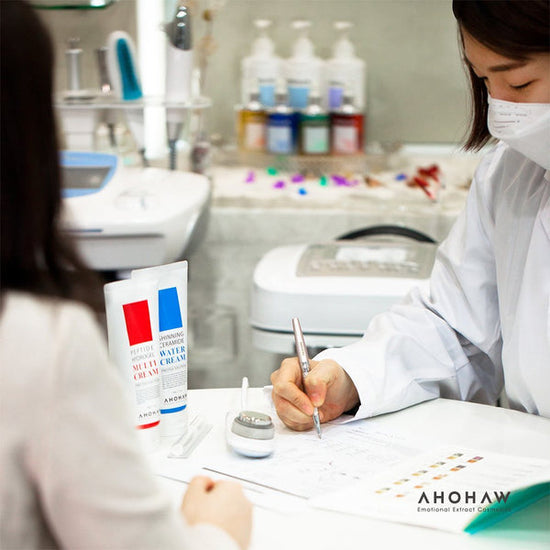How to Increase Customer Loyalty as an Esthetician - Part 1
The Key Point toward Loyal Customer Base, “Trust”
Every experienced esthetician would agree that one loyal customer is preferable over ten one-off customers. The number one factor that leads to building your own line of faithful customers would undoubtedly be “trust”, becoming an esthetician that they can completely trust their skin with.

1. If the Customer Knows One Thing, Inform Them of Four More
We often feel boredom when listening to someone talk about things we already know, because we know there’s no new information to pick up on. This is why it’s important for us as estheticians to communicate knowledge that customers might be familiar with but might not know everything about.
Let’s take niacinamide for example; niacinamide might be something a customer might have heard of if they are someone who’s interesting in skincare.
Most products with niacinamide in the market are marketed as having “brightening/whitening” effects, which is why many people might assume that niacinamide strictly equals brightening. However while brightening is definitely an effect that niacinamide could have on the skin, it also works to moisturize and prevent trans-epidermal water loss, as well as increasing ceramide and fatty acid which helps to strengthen the skin barrier.
In addition, there are also studies showing that after prescribing acne patients with a gel that contains niacinamide twice a day for 8 weeks, 82% of the participants reported seeing improvements in their skin conditions. Furthermore, it also has anti-aging and qualities that could enhance aged-skin as well.
Elevating a customer’s superficial knowledge of esthetics by supplementing them with your professional knowledge can be a great way to increase their trust in you as an esthetician. Because of the general increase of skincare nowadays, many customers are quite aware of which products and/or ingredients are suitable for their specific skin concerns. Start looking into your customers’ skin concerns and what they would individually need in order to utilize those insights when working with them in the future.


2. Catch the Mundane, Everyday Things the Customers Might be Overseeing
If the previous tip was to help strengthen the customers’ trust in you by supplementing their knowledge, now we focus on correcting any misinformation they might have or might be missing.
For example, most estheticians would recommend that their customer wears SPF on a daily basis, but especially in the summer. However, this is something that they can hear from anyone, not just from you. In order to become a memorable and differentiated esthetician in your customer’s eyes, its necessary to take it a step further.
Expanding on the example of SPF, let’s think back to more technical terms such as heat aging and photoaging, or dermatoheliosis. The surface temperature of one’s epidermis should be 4℃-6℃ lower than the body temperature, 36.5℃. However the higher temperature and increased sun exposure in the summer would spike up the surface temperature, resulting in increased number of enzymes that breaks down collagen, skin elasticity diminishing, and cytoclasis (the destruction of cells).
It would also lead to capillary vessels and pores to enlarge, which could mean increased redness for those with especially sensitive skin. Sebum production is also affected, more specifically every time the epidermal temperature rises by 1℃, sebum production rises by 10%. In short, this means that heat aging is directly related to overall skin concerns and inflammation.
Let’s also take a look at everyday things that can affect epidermal temperature.
There’s a high chance that many female customers in the 40-50s are housewives, or at least someone who spends a lot of their time in the house, especially in the kitchen. For this specific demographic, it’s very important to note that the high temperatures that they might be exposed to in the kitchen can be as damaging to their skin as UV rays in sunlight. Even things like saunas or hot tubs can increase the skin temperature by 5-6℃.
To speak the harsh truth, engaging in such activities is equivalent to not only unknowingly yet voluntarily escalating the aging process of the skin but enjoying it as well. Informing your customers that cooling down the skin by washing their face with cold water after sauna can help slow down skin aging, is an easy example of how you can use your professional knowledge to build credibility and therefore trust from your customers. Furthermore, these informative tips and advices can also act as a good starting point to introduce various soothing services that might be offered in the salon/spa.

Professionalism is Correlated to Customers’ Trust and Reliance
While it is true that skin care techniques as well as communication skills should be prioritized as an esthetician, the customer’s trust and reliance is also very important if you want to boost sales through service and product recommendations. Without the customer’s trust and your genuineness, these suggestions can very easily be seen as mere marketing methods, or an attempt to gain personal sales incentives instead of sincere and professional suggestions. Once you successfully utilize these tips mentioned above to gain and strengthen the sense of trust between you and your customers, the stabilization of the profitable income would naturally follow.



